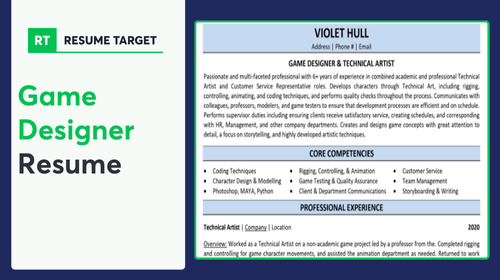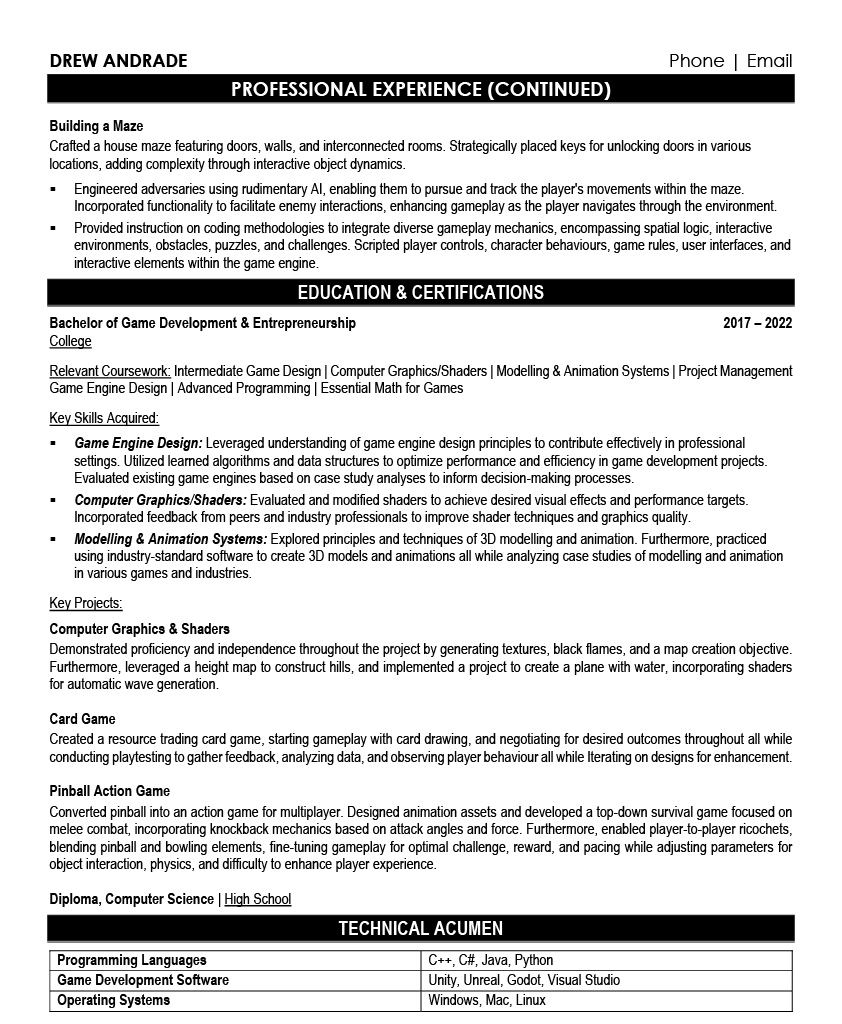

Turning your passion for gaming into a compelling resume feels like beating a final boss without any power-ups. Creating a resume that speaks to both your creative vision and technical abilities can seem overwhelming.
Are you struggling to showcase your game design achievements in a way that hiring managers understand? Your resume needs to bridge the gap between your innovative ideas and measurable results that studios want to see.
Resume Target specializes in helping game designers translate their unique skills into powerful career stories. We know how to showcase your design expertise, technical capabilities, and creative achievements in a format that gets studio recruiters excited to meet you.


As the creative architects behind the $200+ billion gaming industry, game designers craft the immersive digital worlds and compelling storylines that keep millions of players globally coming back for more, with successful designers needing to master both storytelling and user experience design to create engaging gameplay.
Working at the intersection of art and technology, you'll collaborate with diverse teams of programmers, artists, and animators to transform initial concepts into playable experiences, carefully crafting everything from character backstories and game mechanics to level designs and reward systems.
Whether you're interested in indie game development or dreaming of joining a major studio, the game design career path offers multiple specialization opportunities - from narrative design to systems design - with the potential to shape the future of interactive entertainment as you grow in your career.
Let's talk about what's exciting in the Game Designer career path - your earning potential grows significantly as you level up your skills and experience! From entry-level positions to senior roles, your compensation can dramatically increase as you build your portfolio and tackle more complex gaming projects.
Figures from: LinkedIn Career Advice
Game design offers an exciting career path with salaries ranging from $55K to $98K+ as you progress. With a projected 22% job growth by 2029, your journey from junior designer to creative director can be both rewarding and lucrative.
Beyond basic game development knowledge, mastering advanced technical and creative skills will accelerate your journey to senior positions.
- Game Engine Proficiency (Unity, Unreal) - 3D Modeling and Animation - Level Design and World Building - Cross-functional Team LeadershipBreaking into game design typically starts with earning a bachelor's degree in computer science, software engineering, or game design, combined with building a strong portfolio of game projects and prototypes.
To advance in your game design career, you'll need to develop key competencies like UI/UX design, storytelling, and technical implementation through hands-on experience.
Requirements from ComputerScience.org
From tech hubs to emerging gaming centers, the US game design industry is thriving across major studios and indie shops.
Figures from ComputerScience.org
Here's what's exciting: The gaming industry is experiencing a massive 21% growth rate through 2028. And guess what? It's not just about traditional console games anymore - mobile gaming, esports, and VR/AR are creating entirely new opportunities for creative minds like yours. Whether you dream of working with industry giants like Activision Blizzard and Epic Games or joining an innovative indie studio, your game design career can take off in any of these thriving locations.Struggling to showcase your game design projects, technical skills, and creative achievements in a way that catches a hiring manager's attention? This comprehensive, section-by-section guide will help you craft a game designer resume that highlights your best work and demonstrates your ability to create engaging player experiences.
As a game designer, translating your creative vision and technical expertise into a compelling resume summary can feel more challenging than debugging a complex game mechanic.
While you excel at crafting immersive player experiences and balancing gameplay systems, capturing your unique blend of creative storytelling, technical knowledge, and collaborative leadership skills in just a few sentences requires a different kind of strategic thinking that hiring managers need to see.
How would you describe your game design philosophy and its alignment with player engagement and business objectives in one sentence?
Reason: This helps establish your strategic mindset and shows potential employers how you balance creative vision with commercial success, setting the tone for your entire resume.
What unique combination of game design specialties (such as level design, mechanics, narrative, or systems) defines your professional identity in the gaming industry?
Reason: This question helps you articulate your specific value proposition and differentiate yourself from other designers while highlighting your core competencies.
How do you bridge the gap between creative innovation and technical feasibility in your approach to game design?
Reason: This helps showcase your practical understanding of game development constraints and your ability to work effectively with both creative and technical teams, which is crucial for modern game design roles.
As a game designer, you need to showcase both your creative vision and technical capabilities, from game mechanics and level design to project management and collaboration tools.
Your skills section should balance essential technical proficiencies like Unity or Unreal Engine with core game design competencies such as player experience design, gameplay balancing, and narrative development.
Showcase your game development journey by organizing your experience into three powerful sections: a compelling role overview that sets the stage, measurable achievements that highlight your successful game launches and player engagement metrics, and core responsibilities that demonstrate your mastery of game mechanics and team collaboration.
Many game designers struggle to translate their creative and technical contributions into concrete, measurable successes that catch a hiring manager's attention. Transform your achievements into compelling metrics by connecting player engagement, retention rates, and revenue growth to your specific design innovations and gameplay mechanics.
The responsibilities section demonstrates how Game Designers shape player experiences beyond basic game mechanics. Your duties should showcase both creative and technical abilities while explaining complex game development concepts in terms that hiring managers can understand and connect to business success.
Your game design credentials should highlight both formal education and specialized certifications that demonstrate your technical expertise. Focus on featuring qualifications that showcase your proficiency in game development engines, design methodologies, and any specialized training in areas like level design, game mechanics, or interactive storytelling.
Now that you've built a strong foundation using Resume Target's comprehensive resume writing guidelines, you're ready to transform your base resume into a powerful tool for landing your dream game design position.
While many candidates focus solely on customizing their cover letters, successful game designers know that personalizing their resume for each studio and role is crucial for standing out in this competitive industry.
By strategically incorporating specific game engine expertise, design methodologies, and project experience that match each job description, you'll not only sail through ATS screenings but also demonstrate to hiring managers that you're perfectly aligned with their team's needs.
Ready to level up your job search? Let's transform your resume into the ultimate power-up that will help you beat the competition and unlock your next great game design opportunity!
Don't have professional game development experience yet? That's totally fine! Your path to becoming a Game Designer can start with highlighting what you already bring to the table.
Instead of dwelling on unrelated work history, you'll want to showcase your relevant education, technical skills, and any game projects or mods you've created.
Focus on highlighting your game design documentation skills, proficiency with industry-standard tools, and creative problem-solving abilities in your portfolio.
For more guidance on structuring your resume, check out the Student Resume Writing Guide to ensure you're presenting your qualifications in the best possible light.
Your game design resume summary is your chance to showcase your creative projects, technical skills, and passion for gaming - even without years of industry experience.
Focus on highlighting your game development portfolio, relevant coursework, and any collaborative projects that demonstrate your ability to bring innovative gaming concepts to life.
"Creative and technically-skilled Game Designer with hands-on experience developing three fully playable game prototypes during two years of intensive study. Proficient in Unity, Unreal Engine, and C++, with demonstrated ability to create engaging gameplay mechanics and compelling user experiences. Successfully led a four-person student team to develop an award-winning mobile game prototype. Seeking to leverage strong design fundamentals and collaborative skills to create immersive gaming experiences as a Junior Game Designer."
Now's your chance to showcase the specialized training and hands-on projects that have prepared you for an exciting game design career!
Transform your educational background into compelling content by highlighting relevant coursework like "Interactive Storytelling"or "Game Mechanics,"and featuring collaborative game projects where you contributed to design, prototyping, or player experience.
The following courses are common for a Game Designer degree/certification: Intro to design, Intro to programming, Graphic design tools, Intro to modeling, Video game art, and Quality assurance.Relevant Coursework: Intro to Design | Intro to Programming | Graphic Design Tools | Intro to Modeling | Video Game Art | Quality Assurance
Key Projects:
Multiplayer Combat Arena Development: Created a prototype for a competitive multiplayer game focusing on unique character abilities and balanced gameplay mechanics. Developed from concept to playable demo using industry-standard development practices.
Interactive Narrative Game Project: Led a team of four to develop a choice-based adventure game that adapts to player decisions, incorporating branching storylines and multiple endings.
Transform your academic knowledge, personal projects, and technical capabilities into a compelling skills section that showcases your readiness to create engaging gaming experiences through your understanding of game mechanics, design tools, and creative development processes.
As an aspiring Game Designer, your combination of technical skills and creative vision positions you perfectly for entry-level opportunities in this dynamic and expanding gaming industry, where innovation and fresh perspectives are highly valued.
Let's face it - trying to capture your creative genius and technical prowess on paper feels like trying to explain an epic gaming experience in a single screenshot. You know you've got the skills, but showcasing them effectively is a whole different game.
At Resume Target, we speak the language of game design and know exactly how to position your achievements to catch a hiring manager's attention.
Our team has helped countless game designers showcase everything from Unity expertise to successful AAA titles launches, consistently landing them interviews at top gaming studios.
With major studios ramping up their hiring and the indie game scene booming, now is the perfect time to level up your resume - let's chat about transforming yours into an interview-winning achievement.
Impress any hiring manager with our Multimedia resume writing service. We work with all career levels and types of Multimedia professionals.
Learn More → Multimedia Resume Writing Services